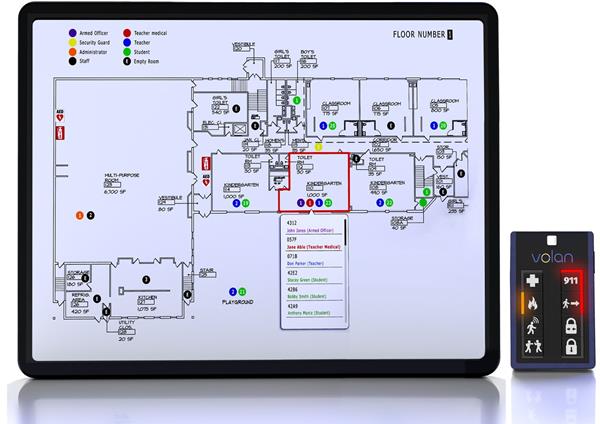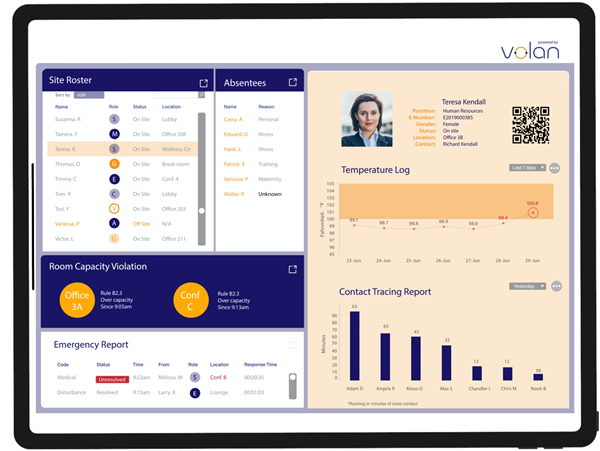Administrators hope tracking beacons will identify where students congregate and who should be isolated if someone contracts the coronavirus.
When Students return to school in New Albany, Ohio, in August, they’ll be carefully watched as they wander through red-brick buildings and across well-kept lawns—and not only by teachers.
The school district, with five schools and 4,800 students, plans to test a system that would require each student to wear an electronic beacon to track their location to within a few feet. The technology logs which students and teachers are in each classroom throughout the day. The hope is such technology could prevent or minimize an outbreak of Covid-19, the deadly respiratory disease at the center of a global pandemic.
Schools and colleges face an incredible challenge come the fall. Across the world, teachers, administrators, and parents are wrestling with how to welcome pupils back into normally bustling classrooms, dining rooms, and dorms, while the threat of the coronavirus remains ever-present.
Many plan to proceed gradually and carefully, while keeping kids spread out as much as possible. The Centers for Disease Control and Prevention’s guidelines for reopening schools recommend staggered schedules that allow for smaller classes, opening windows to provide more air circulation, avoiding sharing books and computers, regular cleaning of buses and classes, and requiring masks and handwashing. Many see some form of distance learning continuing through next year.
A handful also are considering deploying technology to help. “We are very much interested in the automated tracking of students,” says Michael Sawyers, superintendent for New Albany-Plain Schools. He believes that the technology could help the school determine whether social distancing is being observed and help quickly identify students who may have been exposed if someone tests positive for the coronavirus.
Randi Weingarten, president of the American Federation of Teachers says she isn’t aware of other schools looking to adopt detailed surveillance measures. But the AFT has issued guidelines on reopening schools and colleges that warns about vendors potentially using the crisis to expand data-mining practices.
A small but growing surveillance industry has sprung up around Covid already, with firms pitching everything from temperature-tracking infrared cameras and contact tracing apps to wireless beacons and smart cameras to help enforce social distancing at work. “It’s been one of the most disturbing parts of this,” says Albert Fox Cahn, founder of the Surveillance Technology Oversight Project.
Now, Cahn says, this cottage industry is keen to find a way into classrooms. “One of the things that will be a huge profit driver, potentially, is that younger children would need specially designed devices if they don’t have smartphones,” he says.
Like countless other schools, those in the New Albany-Plain district are considering regular temperature checks as well as strict enforcement of mask wearing and social distancing. The additional tracking technology, to be piloted there in coming weeks through summer school classes, comes from Volan, which sells Bluetooth beacons to some schools as a safety tool. The beacons track where people are and send alerts in emergencies. Volan is one of several companies now hoping to sell its technology as an aid to reopening schools.
Katy Abel, associate commissioner for external affairs and special projects at the Massachusetts Department of Higher Education, says some state universities in Massachusetts are exploring use of beacons.
RightCrowd, which sells smart Bluetooth badges to companies including Honeywell and Genentech, has developed one system that issues a warning if people get too close and another that can be used for contact tracing. “We have inquiries coming from many industries including higher education and boarding schools,” says the company’s CEO, Peter Hill.
The pandemic transformed daily life across the world, closing virtually all US schools in March. Glitchy Zoom calls have replaced in-person conversations, and students without good access to computers and high-speed internet risk falling behind. Colleges and private schools that charge substantial fees may find it difficult to justify those charges if students continue to learn from their kitchen tables. The discussion is complicated by the fact children do not seem to spread the coronavirus as readily as adults and are typically not as badly afflicted by Covid-19—although some seem to be at greater risk.
The University of Arizona has begun developing a contact tracing app for students. It will work like those being offered by state public health departments, using Bluetooth signals exchanged between smartphones so that potentially infected students can be identified and tested or quarantined. Officials at several other colleges contacted by WIRED said they were exploring different technologies but it was too early to discuss them.
Marcus Muster, director of technology at the Kiski School, a private boarding school in Loyalhanna Township, Pennsylvania, about 40 miles east of Pittsburgh, says he has talked with Identigy, a company advertising a system to record people’s movements; combined with smart ID cards or Bluetooth beacons, it could help manage Covid risk. The company says the platform will also be compatible with contact tracing apps made by others. “That would be the Cadillac in my opinion,” Muster says. “We know that we need to identify some way to be able to automate the contact tracing process other than just, you know, talking to teachers.”
Brian Betze, superintendent of the schools in Robbinsville, New Jersey, says he would be open to using the Volan system, which he used at his previous school. “We’re always trying to make schools safer for kids, and I believe technology is the best way to do that,” Betze says.
However, Betze, who says the decision about whether to reopen schools in New Jersey will ultimately be made by the governor, seems unsure whether the Volan system—or anything else for that matter—will really keep kids safe. “Middle school kids, high school kids, they want to talk with their friends. They look forward to class, physical education, lunch,” he says. “Until there’s a vaccine, or a treatment, I’m not sure it’s safe to go back.”
Updated, 6/9/20, 2:30pm ET: This story has been updated to better reflect the way Volan’s technology works within a school.
https://www.wired.com/story/schools-surveillance-tech-prevent-covid-19-spread/
Volan Technology Launches First AI-Based Location Positioning System with Contract Tracing, Social Distancing and Temperature Tracking to Help Schools and Workplaces Safely Reopen
Wireless Neural Mesh Network uses precise-location positioning and micro-geofencing to automate private contact tracing and dramatically improve incident response; Top Hotel in Las Vegas and schools in New Jersey and Ohio First to Pilot
| Source: Volan Technology
Volan AI-Based Location Positioning System
Volan AI-Based Location Positioning System
HOBOKEN, N.J., June 05, 2020 (GLOBE NEWSWIRE) — Volan Technology, providers of the only AI-based location positioning system that can dramatically improve workplace safety, announced today the official launch of its Volan Positioning System (VPS).
As offices and schools around the country plan to reopen, the Volan system offers the only private location tracking and geo-fencing option available that provides precise and fast contact tracing solution combined with emergency response capabilities. Volan’s patented technology is a wireless neural mesh network that can dynamically locate and micro-track thousands of moving individuals on site in real-time and historically by segmenting massive sites into geofences for pinpoint, three-dimensional location accuracy. Smart sensors worn by everyone on site create a secure communication network that delivers location and incident information to an encrypted iOS application for authorized individuals.
Since VPS operates independently of smartphones, GPS and the internet, it provides unprecedented location accuracy to improve workplace safety and operational efficiencies while protecting privacy in automating contact tracing, temperature tracking, social distancing enforcement, and incident response handling. The data is only accessible to authorized individuals on-site who are responsible for the safety of the workforce, staff, and students such as the Operations executives, Principals, and responders.
“We started building our product a year and a half ago as a solution to help address the growing problem of violence in the workplace and at schools, helping first responders quickly and precisely locate and communicate with people during a crisis,” said Michael Bettua, CEO and Co-Founder of Volan Technology. “When COVID-19 hit, we realized quickly that our micro-positioning technology could help companies and schools automate virus mitigation such as contact tracing, social distancing, and fever tracking, in addition to smarter incident response handling. These new procedures are critical for getting back to work and school safely. Volan will be a key tool for schools and workplaces that need to address virus mitigation concerns while protecting individual privacy, and it will continue to be an important ongoing technology for improving response time and effectiveness during emergencies.”
Current smartphone-based contact tracing solutions being considered by governments, schools and companies are ‘opt-in’ GPS/Bluetooth tools that are not accurate enough, impractical for workplace and school settings, and also lack privacy. This creates more problems than they are solving as evidenced by the failure of such a tool in Singapore. With Volan, schools and other workplaces can confidentially trace both live and historical direct and room exposure and automatically send risk alerts. Unlike other Contract Tracing tools, Volan’s technology provides anonymous tracking with zero dependency on the individual’s phone and becomes an inactive tracer outside of the site’s mesh network (offsite).
Volan has pilot sites underway at school districts in New Jersey and Ohio, and will be launching a pilot in June in collaboration with one of the largest Las Vegas Hotel and Resort companies.
About the technology
Volan’s patented mesh technology is based on the Bluetooth 5 Low Energy wireless standard and provides pervasive, inexpensive wireless security coverage on the largest possible sites with zero dependency on cellular, GPS, or the Internet. Volan’s sensors detect the exact location of each individual using Geo-fencing and enables both horizontal and vertical location positioning (HVP) of people wherever they are onsite, with no signal loss. This enables private contact tracing of both live and historical room exposure and the ability to automatically send risk alerts and a prioritized list of those exposed. With micro-geofencing, Volan can automate social distancing enforcement and management of protected zones, detect unsafe distances or groupings of individuals in real-time, and send violation alerts to exposure rings.
About Volan Technology
Volan Technology provides the only AI-based Positioning System that can privately locate and communicate with thousands of moving people within a few feet in large buildings, enabling dramatic improvements in virus mitigation and emergency response effectiveness. Pilots are underway with the company’s patented Volan Positioning System at school districts across the country and with a leading hotel and resort company to help safely reopen. Volan Technology is venture-backed and founded by serial entrepreneurs with decades of software and hardware design expertise and a track record of building successful businesses. To learn more visit www.volantechnology.com.
Contact
Kerry Metzdorf
kerry@big-swing.com
Photos accompanying this announcement are available at:
https://www.globenewswire.com/NewsRoom/AttachmentNg/3471d96e-35e7-4787-9d94-582ca33f7a7d
https://www.globenewswire.com/NewsRoom/AttachmentNg/145ce698-9da5-44f9-9626-7b4ada44a037
PDF : Forced Tracking School Children via AI 5G and Satellites


